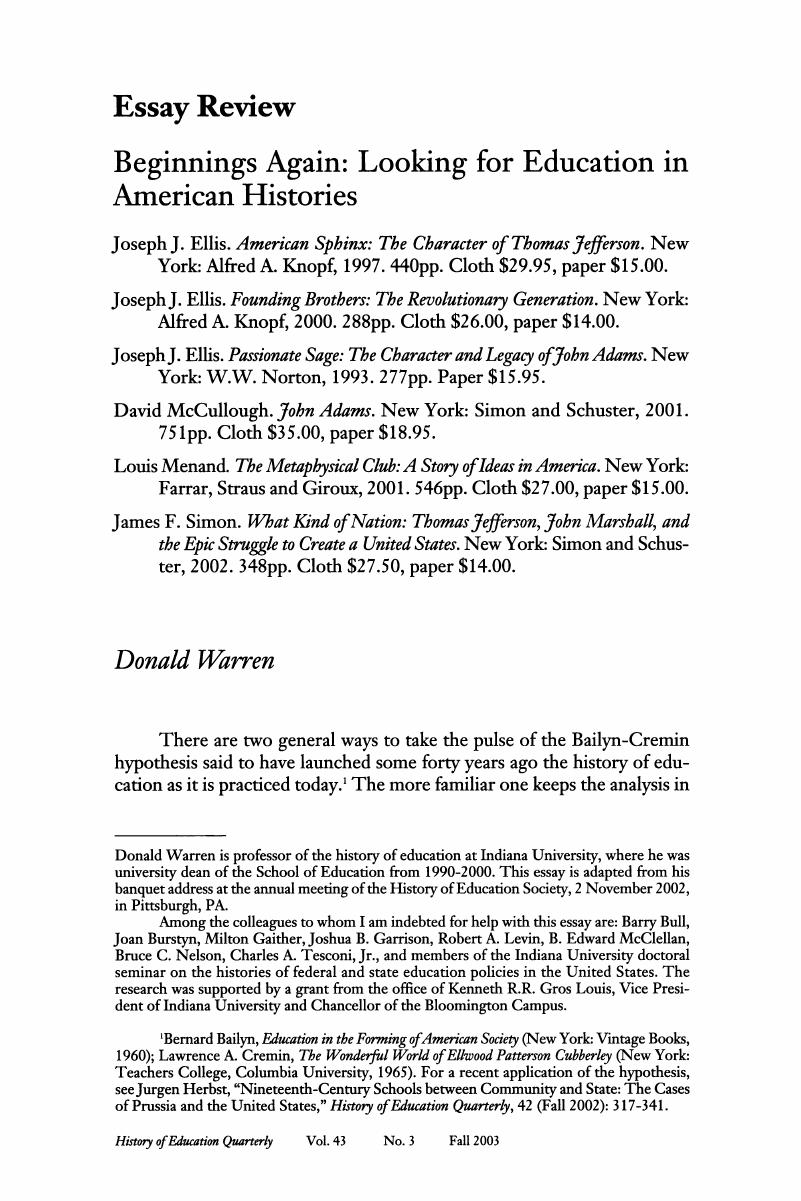Published online by Cambridge University Press: 24 February 2017

1 Bailyn, Bernard Education in the Forming of American Society (New York: Vintage Books, 1960); Lawrence A. Cremin, The Wonderful World of Ellwood Patterson Cubberley (New York: Teachers College, Columbia University, 1965). For a recent application of the hypothesis, see Jurgen Herbst, “Nineteenth-Century Schools between Community and State: The Cases of Prussia and the United States,” History of Education Quarterly, 42 (Fall 2002): 317–341.Google Scholar
2 Bailyn, Education in the Forming of American Society, 48.Google Scholar
3 Ellis, Founding Brothers, 243.Google Scholar
4 Menand, The Metaphysical Club, 433.Google Scholar
5 Adams, John Thoughts on Government, in Taylor, Robert J. (ed.), Papers of John Adams (Cambridge: Belknap Press of Harvard University Press, 1977–1996), IV, 65–73.Google Scholar
6 See, e.g., Ellis, Passionate Sage, 26–55, 228–232. For a more nuanced and consistently applied concept of education, see Joseph J. Ellis, After the Revolution: Profiles of Early American Culture (New York: W. W. Norton, 1979), especially the chapter on Noah Webster, 161–212.Google Scholar
7 Menand, The Metaphysical Club, 25.Google Scholar
8 Ellis, Founding Brothers, 11; Adams used similar phrasing to refer to Massachusetts and New England. See, e.g., McCullough, John Adams, 149.Google Scholar
9 See, e.g., Michael Katz, The Irony of Early School Reform: Educational Innovation in Mid-Nineteenth Century Massachusetts [Reissued edition] (New York: Teachers College Press, 2001), xxix-xxx, 213–218.Google Scholar
10 See Messerli, Jonathan Horace Mann: A Biography (New York, Alfred A. Knopf, 1972), 15–27.Google Scholar
11 Ellis, American Sphinx, 334–343; Bailyn, Education in the Forming of American Society, 46.Google Scholar
12 Cremin, Lawrence A. American Education: The National Experience, 1783–1876 (New York: Harper & Row, 1980), 124–125.Google Scholar
13 Storr, Richard J. “The Role of Education in American History: A Memorandum,“ Harvard Educational Review, 46 (August 1976): 345–347.Google Scholar
14 Katz, Michael B. “Devotion and Ambiguity in the Struggles of a Poor Mother and Her Family: New York City, 1918–1919,“ in Cuban, Larry and Shipps, Dorothy (eds.), Reconstructing the Common Good in Education: Coping with Intractable American Dilemmas (Stanford, CA: Stanford University Press, 2000), 186–205.Google Scholar
15 Storr, “The Role of Education in American History,“ 350–354.Google Scholar
16 Menand, The Metaphysical Club, xii.Google Scholar
17 Bailyn, Education in the Forming of American Society, 42–45.Google Scholar
18 See Altenbaugh, Richard J. (ed.), Historical Dictionary of American Education (Westport, CT: Greenwood Press, 1999), 322, 333 for references to school finance within articles on selected court decisions. The Dictionary contains no separate entries on topics related to educational funding or taxes. On the history of school finance in the U.S., see Nancy Beadie, “The Limits of Standardization and the Importance of Constituencies: Historical Tensions in the Relationship between State Authority and Local Control,” in Theobald, Neil D. and Malen, Betty (eds.), Balancing Local Control and State Responsibility for K-12 Education: 2000 Yearbook of the American Education Finance Association (Larchmont, NY: Eye on Education, Inc., 2000), 47–91. For accounts of “public teaching” institutions e.g., libraries, museums, and art galleries, absent funding and budget data, see Cremin, American Education, 298–334.Google Scholar
19 Ellis, Founding Brothers, 116.Google Scholar
20 McCullough, John Adams, 480.Google Scholar
21 Ellis, Founding Brothers, 88.Google Scholar
22 Ibid, 114.Google Scholar
23 See Moroney, Siobhan “Birth of a Canon: The Historiography of Early Republican Educational Thought,“ History of Education Quarterly, 39 (Winter 1999): 476–491.Google Scholar